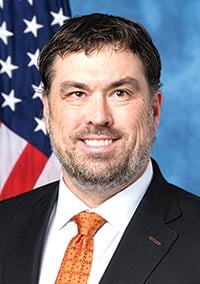Banging a shoe on the podium of liberty
 By Tony Farkas
By Tony Farkas
This email address is being protected from spambots. You need JavaScript enabled to view it.
Pretty much only history buffs or people of an advanced age like me will remember the House Unamerican Activities Committee.
Sen. Joseph McCarthy also had a panel at that time — the Government Operations Committee — and both groups investigated the infiltration of communists and communism in the government and other areas, like Hollywood.
If these groups were dropped into current times, I wonder what they would make of the status quo.
Mostly, I’m referring to the development over the last month of removing candidates from the primary ballots in a couple of states, and not just Donald Trump.
Trump, who is under fire in several legal battles, was pulled off the ballot in Colorado after a court determined — despite no charges being filed or convictions handed down — that Trump was an insurrectionist, and the 14th Amendment bans such people from holding public office.
Similarly, an unelected Secretary of State came to the same conclusion, and Trump was summarily pulled from the ballot in Maine.
In the latest effort from “The Party” and its apparatchiks, Rep. Scott Perry of Pennsylvania is facing a lawsuit to have his name pulled from the ballot. The suit also claims 14th Amendment issues apply, in that Perry tried to stop the Congressional certification of the 2020 election.
Two things are readily apparent here: the rule of law, specifically that of due process (also ensconced in the 14th Amendment), is immaterial to people pushing the insurrection narrative; and that should any of this succeed, then anyone can be said to be an insurrectionist even if only saying something insurrectiony and will suffer the same fate.
(Incidentally, insurrection is an actual criminal offense, which requires arrest and court proceedings before a conviction is made.)
Doesn’t that sound a little communisty? McCarthy would be sharpening his fangs, I think.
In communism, The Party (read: Democrats) is the ultimate rule, which also means that only the opposition (read: Republicans) will suffer this fate, which also is the hallmark of a socialist government.
Socialist governments also control information, which in our country means the mainstream media and what has been described as “useful idiots” purveying their particular brand of stupidity to the masses via TikTok or Snapchat or what have you. And since schools are trending toward teaching a brand of revisionist history (CRT or the 1619 Project, anyone?), the past is either romanticized or demonized, depending on the needs of The Party.
Seriously. We always have been at war with Eastasia, and 2 plus 2 does equal 5.
The beginning of the downfall of McCarthyism and the HUAC nonsense was when Joseph Welch, who was defending his firm against accusations made by McCarthy against one of the attorneys, said, “Until this moment, Senator, I think I never really gauged your cruelty or your recklessness. Let us not assassinate this lad further, senator. You have done enough. Have you no sense of decency?”
The movement to remove names from ballots has had negative reverberations even within The Party, so it’s now time for all of us to look at our “leaders” and say to them what Welch said to McCarthy.
T
ony Farkas is publisher of the San Jacinto News-Times and the Trinity County News-Standard. He can be reached at This email address is being protected from spambots. You need JavaScript enabled to view it.. The views expressed here are his own and do not necessarily reflect the views of this publication.
- Hits: 721



 Okay, maybe I’m approaching this from a position of privilege.
Okay, maybe I’m approaching this from a position of privilege.